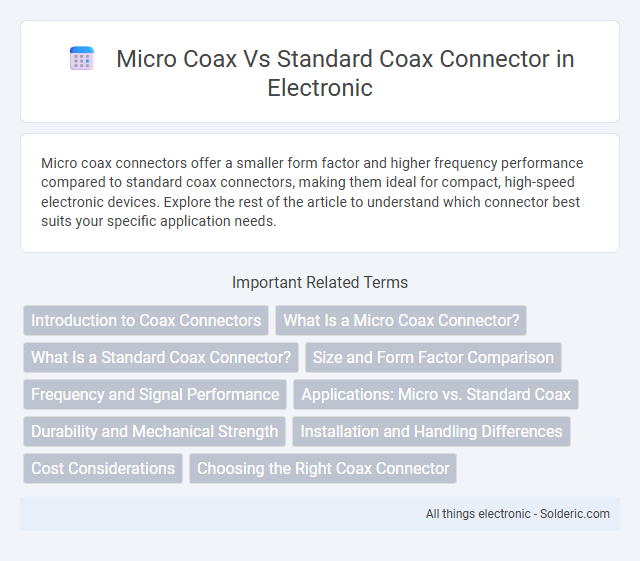Micro coax connectors offer a smaller form factor and higher frequency performance compared to standard coax connectors, making them ideal for compact, high-speed electronic devices. Explore the rest of the article to understand which connector best suits your specific application needs.
Comparison Table
| Feature | Micro Coax Connector | Standard Coax Connector |
|---|---|---|
| Size | Very small, designed for compact devices | Larger, suited for general applications |
| Frequency Range | Up to 6 GHz or higher | Typically up to 3 GHz |
| Impedance | 50 Ohms standard | 50 or 75 Ohms depending on type |
| Applications | Mobile devices, aerospace, medical equipment | TV, radio, broadband, CCTV systems |
| Durability | High precision, delicate handling required | Robust, suitable for harsh environments |
| Cost | Higher due to miniaturization | Lower, widely available |
Introduction to Coax Connectors
Micro coax connectors offer a compact, high-frequency solution designed for space-constrained applications, contrasting with standard coax connectors known for robustness and widespread use in traditional RF systems. These connectors maintain impedance consistency, signal integrity, and shielding effectiveness essential for high-speed data transmission in telecommunications and aerospace sectors. Your choice between micro coax and standard coax connectors depends on device size constraints, frequency requirements, and environmental considerations.
What Is a Micro Coax Connector?
A Micro Coax connector is a compact, high-frequency interconnect designed for use in tight spaces where standard coax connectors are too large. It supports signal transmission in modern electronics, such as smartphones, wearables, and IoT devices, offering superior performance at microwave frequencies. Compared to standard coax connectors, Micro Coax connectors provide improved density and reduced signal loss in miniaturized applications.
What Is a Standard Coax Connector?
A standard coax connector is a type of RF connector designed to join coaxial cables with devices, ensuring efficient signal transmission for TV, internet, and other communication systems. These connectors typically comply with universal sizes like F-type, BNC, or RCA, providing secure and stable connections. Your choice between micro coax and standard coax connectors impacts installation space and signal integrity, with standard coax connectors being more common in everyday consumer electronics due to their durability and ease of use.
Size and Form Factor Comparison
Micro coax connectors feature a significantly smaller size and compact form factor compared to standard coax connectors, making them ideal for space-constrained applications like smartphones and wearable devices. Standard coax connectors typically have larger diameters and bulkier designs suited for traditional RF and video transmission in telecommunications and broadcast equipment. The reduced footprint of micro coax connectors enables higher density interconnects and enhanced performance in miniaturized electronic systems.
Frequency and Signal Performance
Micro coax connectors offer superior frequency handling capabilities, typically supporting signals up to 26 GHz or higher, compared to standard coax connectors that usually operate effectively up to 6 GHz. This enhanced frequency range in micro coax connectors minimizes signal loss and preserves signal integrity, making them ideal for high-speed data transmission in compact electronic devices. Your choice of connector directly impacts signal performance, with micro coax providing better resilience against interference and attenuation at higher frequencies.
Applications: Micro vs. Standard Coax
Micro coax connectors are ideal for compact electronic devices such as smartphones, tablets, and wearable technology, where space constraints demand miniature interconnect solutions. Standard coax connectors are widely used in larger-scale applications like cable television, satellite communication, and broadband internet due to their robust performance and ease of handling. The choice between micro and standard coax connectors depends on size limitations, frequency requirements, and environmental conditions of the specific application.
Durability and Mechanical Strength
Micro coax connectors offer superior durability and mechanical strength compared to standard coax connectors due to their compact design and robust materials, making them ideal for high-density electronic applications. Their smaller size does not compromise resilience; instead, it enhances performance under vibration and mechanical stress conditions common in aerospace and medical devices. When selecting connectors for your project, consider micro coax for reliable, long-lasting connections in demanding environments.
Installation and Handling Differences
Micro coax connectors require precise installation techniques due to their smaller size, often demanding specialized tools and careful handling to avoid damage. Standard coax connectors offer easier installation with more robust housing, allowing for quicker assembly in typical environments. Your choice depends on the application's space constraints and handling capabilities, with micro coax providing compactness and standard coax ensuring durability during installation.
Cost Considerations
Micro coax connectors typically incur higher manufacturing costs due to precision engineering and smaller materials, impacting overall product pricing. Standard coax connectors benefit from widespread use and established production lines, resulting in more affordable costs and easier availability. Choosing between micro coax and standard coax connectors depends on balancing budget constraints with specific application requirements, such as size and performance.
Choosing the Right Coax Connector
Micro coax connectors offer a compact design ideal for high-frequency signals and space-constrained applications, while standard coax connectors provide robust durability and ease of installation for general-purpose use. Your choice depends on the balance between size limitations, signal integrity requirements, and environmental conditions, as micro coax excels in miniature electronics and standard coax suits most RF and video connections. Selecting the right coax connector ensures optimal performance and reliability tailored to your specific technical needs.
Micro coax vs Standard coax connector Infographic

 solderic.com
solderic.com